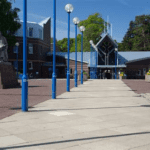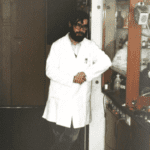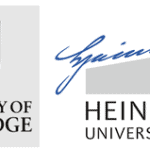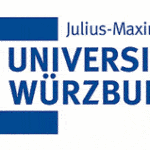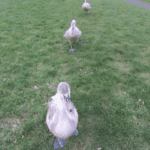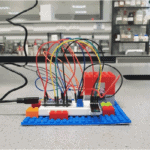Profile
Arno Kraft
-
About Me:
I am German and went to school and university in Germany. Moved to the UK in 1999 and work as a lecturer in Chemistry.
-
Read more
My hobbies are cooking, listening to audiobooks, watching movies (in French).
Foreign languages were not my strong point at school. Since I am not a native English speaker, practising languages is important. This explains why I like listening to audiobooks in English or French. Harry Potter in French is quite some fun. Since I read the books (in English) I know how it ends and this helps a lot. Watching movies and whodunnits in French is exciting as well. You learn, as well as start dreaming about the next holiday abroad.
-
My pronouns are:
he/him
-
My Work:
Teaching Chemistry and being in charge of the teaching within the discipline
-
Read more
Teaching includes lectures, workshops and laboratory classes. All these require quite a bit of preparation time. During lectures the lecturer speaks most of the time. In recent years, many lectures have been replaced by interactive workshops. In a workshop, students the work while the lecturer just walks around and makes comments 🙂. Lab classes are important because Chemistry is a subject which requires hands-on practical skills. Students have to learn these skills. Later they can decide to specialise in an area that is still practical, or use computers for their research.
As Head of Teaching in my discipline, I take responsibility for a lot of paperwork and am attending a lot of meetings. This is important, although not always so exciting.
-
My Typical Day:
I wake up and have breakfast. Switch on the computer at home at 5:30am (yes, no typo) to do a bit of undisturbed work, take a break to exercise, then walk to University where I work from 8am mostly in my office except when I am in class. Go home at 5pm.
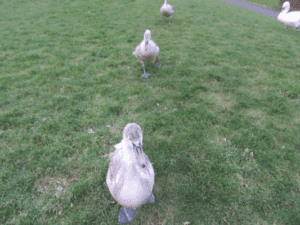
Welcome by the swans on our campus
-
Read more
At home, cook dinner usually. Then relaxing for the rest of the evening.
-
What I'd do with the prize money:
Together with some project students we have been working for some time on making small analytical instruments such as a colorimeter or fluorimeter. The idea was to use simple electronic components, an Arduino microprocessor and a little programming to create an affordable working instrument that could be used in schools.
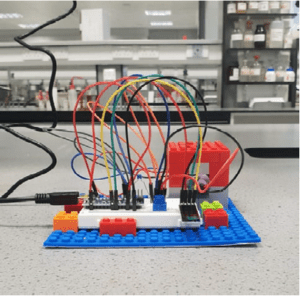
A Lego colorimeter
-
Education:
1967 – 1980: Went to primary school in Darmstadt in Germany, then 9 months secondary school in the same city. When we moved to another city, Wuerzburg, and I attended secondary school there.
The schools I went to were all named after famous people.
Goetheschule – named after a famous German poet in the 18th/19th century
Justus-Liebig Gymnasium – named after a famous chemist
Röntgen-Gymnasium – named after the famous scientist who discovered X-rays
At least, the last two guys had an influence on my career 🙂.
-
Qualifications:
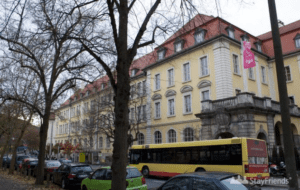
My old school
1980: Finished school with my Abitur, the final school exam in German secondary schools.
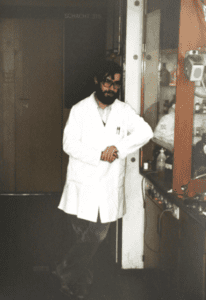
Working hard as a PhD student
1981 – 1989: Then went to the local University to study Chemistry, which took 5 years to earn the first degree. This was followed immediately by the PhD, during which I worked on a research project – another 3 years, although I spent only the first 2 1/3 years doing the actual lab work and the remaining 9 months writing it all up and preparing for the PhD viva.
-
Work History:
1989: When I finished my PhD after having passed the oral exam, I actually had no job. However, within a week I was asked on the staircase by one of the professors whether I would take a part-time job for a few months to teach his group some of the things I had done during my PhD and got a phone call for an interview for a postdoc position. I accepted both. Postdoc = a period of one of more years after having finished with a PhD where you work in a research group doing research.
1990 – 1992: Then followed 3 years as a postdoc at the University of Cambridge, which was very exciting since it involved developing some of the first OLEDs or organic light emitting diodes that were brand-new at the time and in the 30 years that followed became household items.
1993 – 1999: Another 7 years back in Germany at the University of Dusseldorf working on my own research ideas and learning how to teach.
1999: Then got an offer from Heriot-Watt in Edinburgh to become a University lecturer.

Moving around a bit
-
Current Job:
Associate Professor and Head of Teaching for Chemistry. Sounds more glamorous than it is. The job as lecturer involves:
- teaching
- demonstrating in labs where I often ask students unexpected questions
- preparing lectures and new learning materials (slides, videos, apps)
- chatting with students
- a bit of research (time permitting)
Head of Teaching duties take officially 40% of my time, although it sometimes feels more like 80%:
- going to meetings
- organising teaching-related staff meetings
- paperwork (a lot)
- chairing Boards
- chatting with students
-
Employer:
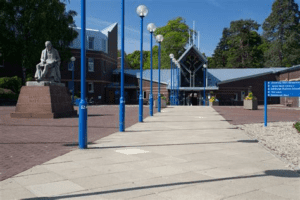
Heriot-Watt Main Entrance
Heriot-Watt University in Edinburgh

Getting a welcome by the swans on our campus
-
My Interview
-
What did you want to be after you left school?
I worked for over a year in a care unit of a hospital as part of a community service.
Were you ever in trouble at school?
Yes. My secondary S1 teacher had grave doubts that I would make it due to my poor grades in Maths and English (as a foreign language).
If you weren't doing this job, what would you choose instead?
Probably, be unhappy.
Who is your favourite singer or band?
No favourite.
What's your favourite food?
I am very fond on fine dining (as long as it's affordable). Anything that qualifies, really. .
If you had 3 wishes for yourself what would they be? - be honest!
Sounds like a fairy tale ...
Tell us a joke.
Sorry, no jokes ..
-

